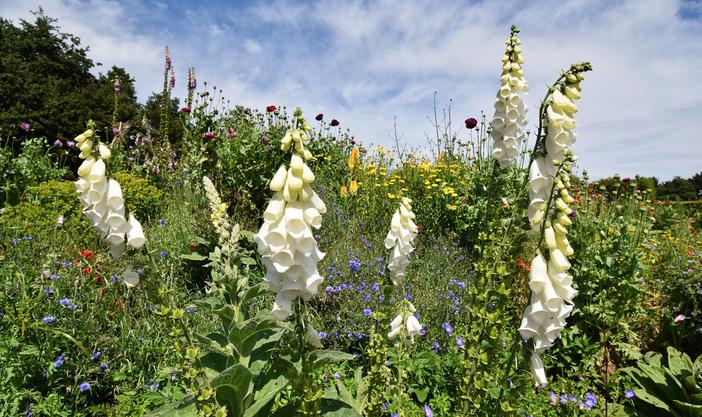Common Foxglove
(Digitalis alba)
Common Foxglove (Digitalis alba)
/
/

Mark
CC BY 2.0
Image By:
Mark
Recorded By:
Copyright:
CC BY 2.0
Copyright Notice:
Photo by: Mark | License Type: CC BY 2.0 | License URL: https://creativecommons.org/licenses/by/2.0/ | Uploader: Mark Wordy | Publisher: Flickr


















Estimated Native Range
Summary
Digitalis alba, commonly known as Common Foxglove, is a semi-evergreen to deciduous perennial herb native to woodlands, heathlands, and moorlands across Western and Southwestern Europe, including the Balearic Islands. It typically grows to a height of 3-5 feet (0.9-1.5 meters) and a width of 1-2 feet (0.3-0.6 meters). The plant is characterized by its tall spikes of tubular flowers, which range in color from purple to pink, white, and yellow, with spotted throats. These blooms are highly showy and appear in late spring to early summer. The foliage is a basal rosette of soft, green leaves, and the plant may produce secondary flower spikes later in the season.
Common Foxglove is valued for its striking vertical accent in garden design and its ability to attract pollinators such as bees. It is commonly used in cottage gardens, woodland plantings, and as a background plant in borders due to its height and floral display. Foxglove prefers partial shade but can tolerate full sun in cooler climates. It requires well-drained soil and can be drought-tolerant once established. While it self-seeds readily, care should be taken as all parts of the plant are toxic if ingested. It’s important to note that Digitalis alba is used medicinally to produce the heart medication digoxin, but it should not be used without professional guidance due to its toxicity.CC BY-SA 4.0
Common Foxglove is valued for its striking vertical accent in garden design and its ability to attract pollinators such as bees. It is commonly used in cottage gardens, woodland plantings, and as a background plant in borders due to its height and floral display. Foxglove prefers partial shade but can tolerate full sun in cooler climates. It requires well-drained soil and can be drought-tolerant once established. While it self-seeds readily, care should be taken as all parts of the plant are toxic if ingested. It’s important to note that Digitalis alba is used medicinally to produce the heart medication digoxin, but it should not be used without professional guidance due to its toxicity.CC BY-SA 4.0
Plant Description
- Plant Type: Herb
- Height: 3-5 feet
- Width: 1-2 feet
- Growth Rate: Moderate
- Flower Color: White
- Flowering Season: Summer
- Leaf Retention: Semi-deciduous
Growth Requirements
- Sun: Full Sun, Part Shade
- Water: Low, Medium
- Drainage: Medium
Common Uses
Bee Garden, Bird Garden, Border Plant, Butterfly Garden, Deer Resistant, Drought Tolerant, Hummingbird Garden, Low Maintenance, Potted Plant, Rabbit Resistant, Showy Flowers
Natural Habitat
Woodlands, heathlands, and moorlands across Western and Southwestern Europe
Other Names
Common Names: Fairy Cap, Purple Foxglove, Roter F., Digitale Pourpre, Roter Fingerhut
Scientific Names: , Digitalis alba, Digitalis purpurea subsp. purpurea, Digitalis purpurea var. purpurea, Digitalis purpurea subsp. nevadensis, Digitalis nevadensis, Digitalis speciosa, Digitalis purpurea var. tomentosa, Digitalis purpurea subsp. bocquetii, Digitalis tomentosa
GBIF Accepted Name: Digitalis purpurea subsp. purpurea